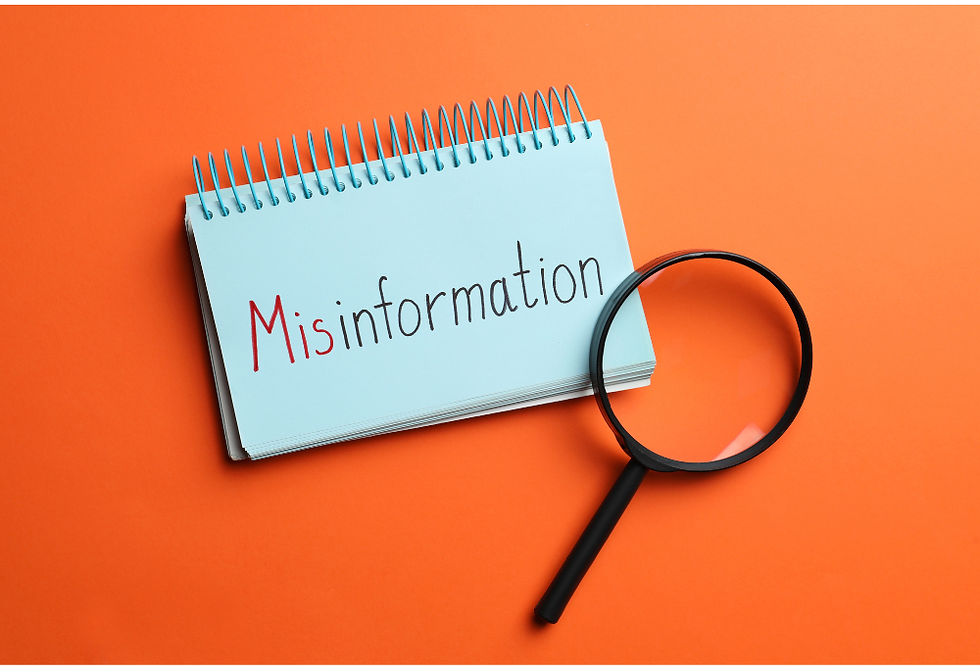Climate Change Misinformation, Disinformation, and Fake News
- Jun 20, 2025
- 3 min read
Updated: Nov 14, 2025

Misinformation: All incorrect information, accidental or intentional. For example, the Earth is the center of the solar system.
Disinformation: Knowingly false information used intentionally to influence people. For example, companies and politicians spreading climate change denialism.
Fake News: Any inaccurate information designed to look like regular news. For example, the “1835 Moon Hoax”.
To delve deeper, check out the full article by Lark Scientific Researcher Jeremy Wright, Climate Change Misinformation, Disinformation, and Fake News.
The concept of misinformation has been around for a very long time and is colloquially considered a synonym for disinformation and fake news. Academic discourse, however, uses these terms separately to describe distinct concepts.
Misinformation is an umbrella term that refers to all incorrect information about the world, regardless of content or the intentions behind its creation and release. Misinformation can be the product of simple mistakes, the manipulation of events and evidence to achieve a specific goal, or a combination of the two. Importantly, misinformation is not always threatening or the product of malicious intent. For example, Copernicus and Galileo were chastised by academics, the church, and society for suggesting that the sun was the centre of the solar system instead of the Earth.

Disinformation, on the other hand, is a type of misinformation built on a foundation of ill-intent and a desire to distort facts to achieve a goal by acting dishonestly. Disinformation is typically created and spread by those who have a vested interest in benefitting from people, government, and businesses having an inaccurate understanding of a situation (i.e., holding false beliefs about something). For example, ExxonMobil was found to have identified the threat of burning high levels of fossil fuels in the early 1950s and constructed a series of media campaigns to discredit any scientific evidence.
Fake News is a little different than the other two because its defining feature is the format of the information, instead of its content or intentions. More specifically, fake news can be either misinformation or disinformation as long as it is structured like traditional news media, as it appears in print, radio, or TV broadcasts. A fun example of harmless fake news is the “1835 Moon Hoax,” where a New York newspaper ran a series of stories about human-bat hybrids colonizing the moon.

Climate Change (Mis/Dis)information
Climate change (mis/dis)information is particularly dangerous because it negatively impacts all human civilizations, plants, and animals.
The intention of climate change (mis/dis)information is to flood people with false information, so they get confused about what is true and what is false.
When people are confused about the reality of climate change, they cannot make informed decisions, and climate change gets worse. So, learn from the experts and watch out.
Climate change (mis/dis)information is particularly destructive because there are widespread negative impacts on civilization and natural ecosystems. Unlike creatures living on the moon, misunderstandings about climate change negatively impact the entire globe. To describe the gravity of climate change (mis/dis)information, many scholars have described it as one of the greatest threats to all of the humans, plants, and animals who call this planet home.
If it is so dangerous, why does climate change (mis/dis)information exist?
Great question! There are two main reasons: Because a) sometimes we get things wrong, and b) so someone can gain something from climate change denial. The ‘point’ of climate change disinformation is not necessarily to make people believe something specific. It is to bombard people with information to confuse them about what is true and what is false. If people are confused, it makes it impossible for them to make informed decisions about how to act sustainably.
So, learn from the experts, watch out, and remember that knowledge is power.


